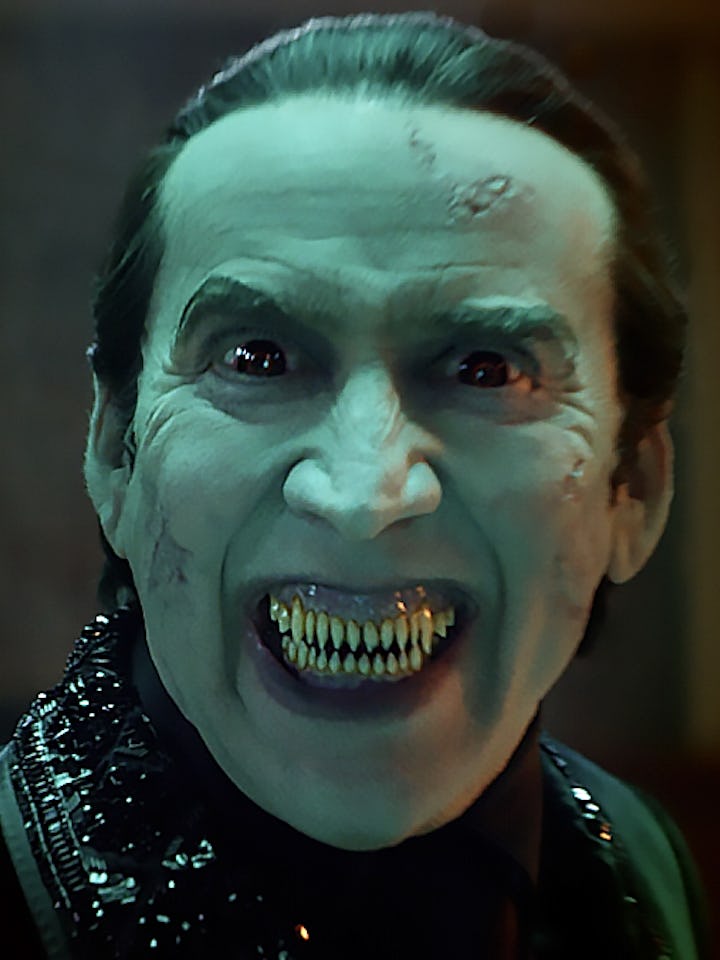Renfield is All Blood and No Bite
Not even Nicolas Cage can save this uninspired vampire romp.

If there’s any reason to be drawn to Renfield over the stiff competition it faces in theaters, it’s Nicolas Cage.
Cage goes for bloody broke in his latest role as Dracula, his razor teeth and a ghostly visage splitting the difference between Bela Lugosi’s tempting Transylvanian and Nosferatu. Regrettably, Cage is still, ahem, caged in a middling R-rated comedy where Dracula’s lawyer-turned-servant, Renfield (played by Nicholas Hoult) learns to liberate himself from his abusive employer.
Despite a good (severed) head on its shoulders including stray moments of comic acuity and agreeable notions about boundaries and our personal worth over our work, Renfield’s overabundance of worn self-aware humor and inordinate bloodletting collectively amplify its most damning curse of all: the absence of an appealing personality. Despite strong creative fingerprints from director Chris McKay (The Lego Batman Movie) and The Walking Dead creator Robert Kirkman who pitched the story, Renfield takes little advantage of its strongest assets to actually leave a bite mark on the horror-comedy genre.
A pseudo-sequel to the 1931 classic Dracula, the same Lugosi vehicle that forged Universal’s world-famous monsters franchise (watch in awe as a black and white prologue impressively edits Cage and Hoult in recycled footage), Renfield picks up in the modern day to follow its title character still serving his callous and increasingly overambitious master. A break in their routine brings Renfield to an abusive relationship support group, inspiring a reappraisal of his dignity. A run-in with a powerful crime family, led by Teddy (Ben Schwartz) and his ruthless mother Ella (Shohreh Aghdashloo, whose smoker’s voice brings some needed mystique) turns New Orleans into a battleground for Renfield’s centuries-old blood feud with his boss.
While Cage picks up Lugosi’s mantle with zeal to teeter between the persona of a gruesome monster and a knee-slapping buffoon, Renfield tonally whiplashes from Tod Browning’s morose gothic classic. There’s more in common here with Taika Waititi’s What We Do in the Shadows, Robert Rodriguez’s From Dusk Till Dawn, the Blade trilogy, and Cage’s own 1988 comedy Vampire’s Kiss. But Renfield doesn’t match up to bloodsucking blockbusters of yore with the same skill, style, or even playfulness. Geysers of gore and punchy one-liners populate its 93-minute runtime, which is sure to make it a favorite in future midnight screenings. But there’s little craftsmanship in the movie’s most crowd-pleasing moments to make up the movie’s lackadaisical and agonizing plotting (replete with freeze frames and a downright infuriating Yup, that’s me tone to the narration).
Renfield stars Nicolas Cage, as Dracula, whose familiar (Nicholas Hoult) finally learns to stand up for himself.
It’s not that Renfield is too stupid or too violent to be enjoyed, it’s just that Renfield simply doesn’t know the story it wants to tell. It doesn’t strive to conjure screams as a proper horror in the slightest (a waste, considering how chilling Cage looks in makeup) but it doesn’t entertain as a romantic comedy either, with its unconvincing and sexless pairing of Hoult and Awkwafina (as love interest Rebecca, a cop with a sailor’s mouth). It’s also a terribly messy action movie, with Jackie Chan-style choreography but none of Chan’s deft touch — not that you can see what’s going on anyway, with its nauseating camera moves and incoherent staging.
Renfield is best understood as a character piece that ought to be singularly preoccupied with its overworked underdog. The problem is not only that Renfield is simply unappealing as a character (despite a solid try by Hoult, who is something of an underrated talent). It’s that Renfield, rather ironically given its themes, tries too hard to please, and ends up giving a half-hearted effort to many things instead of its whole heart to one. Which is maddening, because the one story Renfield should focus on is mighty obvious.
Ben Schwartz and Shohreh Aghdashloo add some needed charisma to the cast of Renfield. Sadly, it’s not enough to be its salvation.
Renfield rises from the ashes of the Dark Universe, Universal’s failed franchise resurrecting its classic monsters to rival the Marvel superheroes. After the abysmal box office of 2017’s The Mummy, Universal surrendered its icons to filmmakers with vision. In the footsteps of Leigh Whannell’s mesmerizing sci-fi The Invisible Man, which reimagined the story into a nightmare of domestic abuse, Renfield unpacks a different uneven power dynamic — that of an overbearing boss and his employee — that should feel a touch more resonant than it does in the pandemic-wrought time of “Quiet Quitting.” After all, Dracula is the worst boss. He demands more than what’s possible, he thrives off others’ labor, and he lives forever.
But Renfield is confused about their particular dynamic, with present psycho-sexual tensions that tend pop up in other vampire tales. (To be fair, vampires are subconsciously sexual creatures, and there’s longstanding debate that Dracula/Renfield have always been peculiar bedfellows.) But stray lampshading about Dracula’s survival, which is dependent on purity rather than his perversion, and the presence of an entire romantic B-plot leaves Renfield uncommitted to the true underpinnings of its two leads. They’re too vaguely between a spectrum that has “Emperor and Darth Vader” on one end and “Joker and Harley Quinn” on the other, and Renfield lacks the skill to land on either side.
Renfield isn’t all doom and gloom. Nicolas Cage’s full bodied commitment to his role as a flamboyant bloodsucker is one for the books in the actor’s body of work and there’s occasional comedic brilliance that allows the movie to shine like a silver bullet. It’s just unfortunate Renfield totally doesn’t amount into a stage for Cage’s Dracula than it ends up as a coffin, confining his oversized talent to limited trappings.